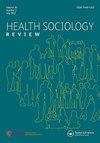Prayer and health-seeking beliefs in Ghana: understanding the ‘religious space’ of the urban forest
IF 2.5
2区 医学
Q2 HEALTH POLICY & SERVICES
引用次数: 22
Abstract
ABSTRACT Few studies have examined the relationship between religiosity and health-seeking belief outcomes in Ghana. Drawing on in-depth interviews and group discussions with informal prayer group members and leaders in Accra, Ghana, the study explores participants’ conceptions of illnesses and the significance of the forest as a place of gathering and healing. There are several reasons why prayer group members in this study make their way to the forest, including finding a serene sacred space in a crowded city to confront the vicissitudes of life. Disease, for the prayer group members, is seen to hold both spiritual and physical origins, inspiring them to seek both biomedical and spiritual forms of care. Interviewees believed hospitals could help with physical diseases, but saw spiritual diseases as requiring spiritual solutions. There was a salient differentiation expressed between treatment and healing, however: doctors can treat certain conditions, but only God heals. While there is a need for public health practitioners to better engage spiritual/religious leaders and their followers with mainstream biomedicine, and to challenge some of their misconceptions and mistrust, attending to and understanding the role of religious beliefs, and religious spaces, in everyday conceptions of health, would strengthen the promotion of both men’s and women’s health in this context.加纳的祈祷和追求健康的信仰:理解城市森林的“宗教空间”
摘要在加纳,很少有研究考察宗教信仰与追求健康的信仰结果之间的关系。该研究通过对加纳阿克拉非正式祈祷小组成员和领导人的深入采访和小组讨论,探讨了参与者对疾病的概念以及森林作为聚会和治疗场所的重要性。在这项研究中,祈祷团成员前往森林的原因有几个,包括在拥挤的城市中找到一个宁静的神圣空间来面对沧桑。对于祈祷团成员来说,疾病被视为具有精神和身体双重起源,激励他们寻求生物医学和精神形式的护理。受访者认为医院可以帮助治疗身体疾病,但认为精神疾病需要精神上的解决方案。然而,治疗和治愈之间有一个显著的区别:医生可以治疗某些疾病,但只有上帝才能治愈。尽管公共卫生从业者需要更好地让精神/宗教领袖及其追随者参与主流生物医学,并挑战他们的一些误解和不信任,关注和理解宗教信仰和宗教空间在日常健康概念中的作用,将在这方面加强促进男女健康。
本文章由计算机程序翻译,如有差异,请以英文原文为准。
求助全文
约1分钟内获得全文
求助全文
来源期刊

Health Sociology Review
Multiple-
CiteScore
7.50
自引率
0.00%
发文量
14
期刊介绍:
An international, scholarly peer-reviewed journal, Health Sociology Review explores the contribution of sociology and sociological research methods to understanding health and illness; to health policy, promotion and practice; and to equity, social justice, social policy and social work. Health Sociology Review is published in association with The Australian Sociological Association (TASA) under the editorship of Eileen Willis. Health Sociology Review publishes original theoretical and research articles, literature reviews, special issues, symposia, commentaries and book reviews.
 求助内容:
求助内容: 应助结果提醒方式:
应助结果提醒方式:


